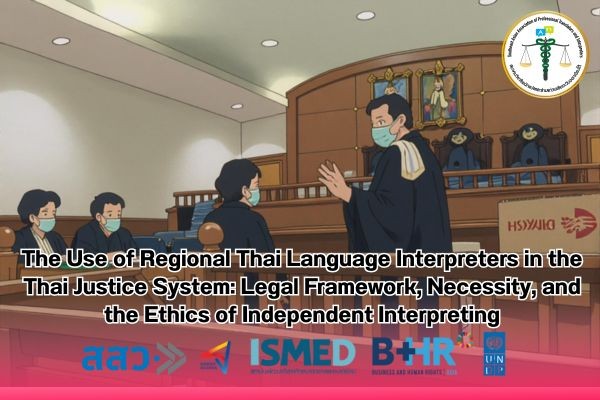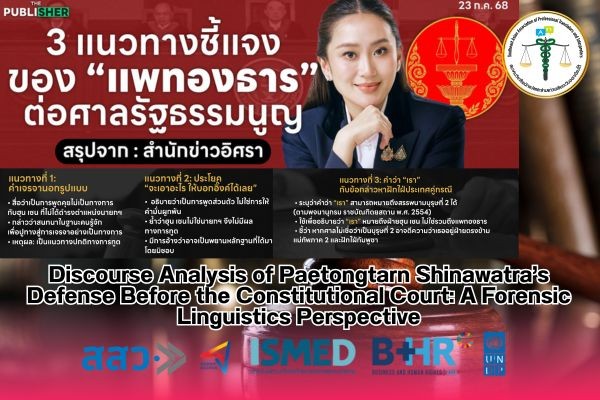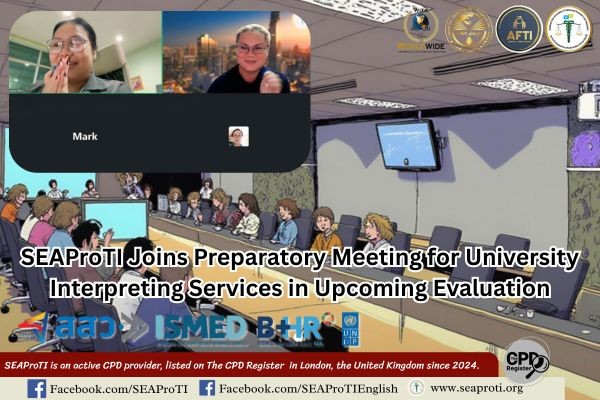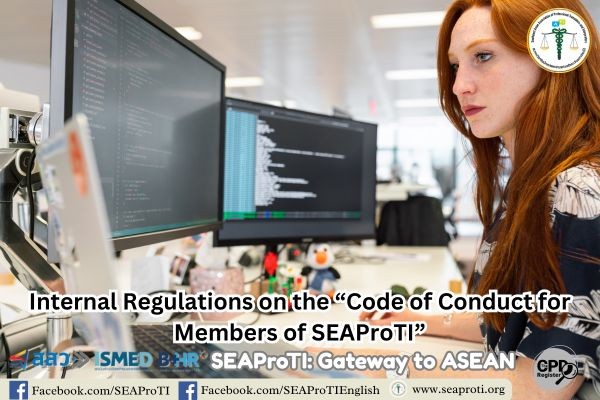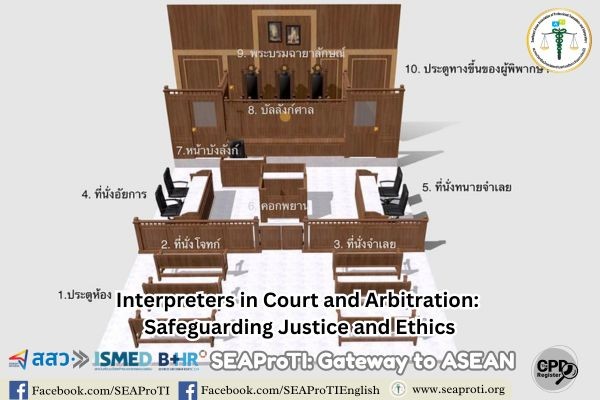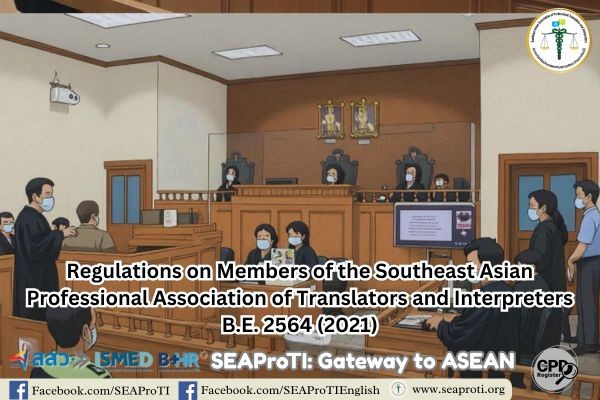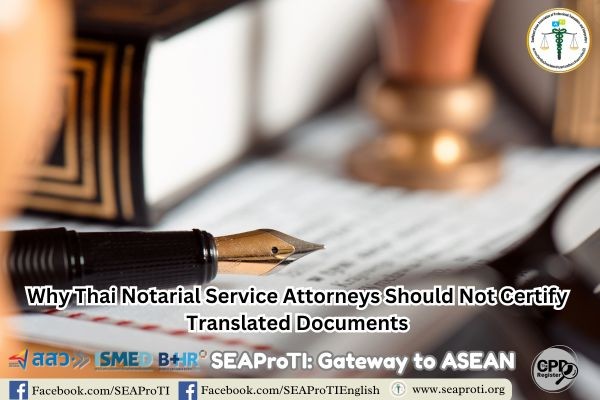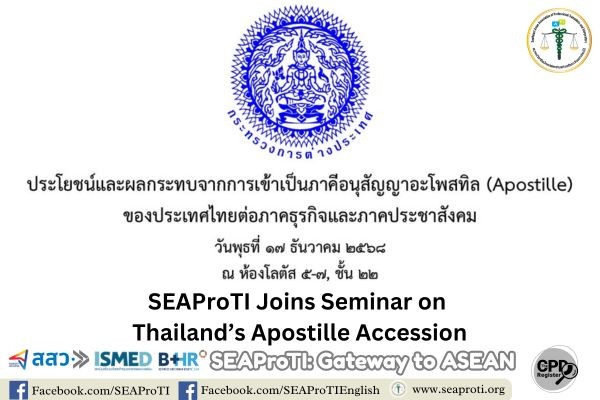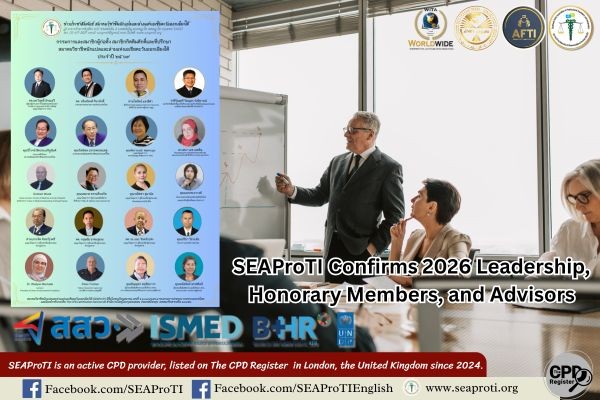The Use of Regional Thai Language Interpreters in the Thai Justice System:
Legal Framework, Necessity, and the Ethics of Independent Interpreting
1 August 2025, Bangkok – This article examines the necessity of employing interpreters for regional Thai dialects in Thailand’s justice system through legal, human rights, and ethical lenses. Drawing on the International Covenant on Civil and Political Rights (ICCPR) and amendments to Thailand’s Criminal Procedure Code, the article argues for the legal and moral obligation to ensure fair access to justice for individuals who do not understand standard Thai. It further contends that interpreters must be independent, impartial, and ethically grounded, particularly in light of the growing number of interpreters affiliated with law firms who tend to translate in favor of their clients, thereby distorting judicial outcomes.
Introduction
Language is a fundamental tool for communication and understanding. In a multilingual society such as Thailand, where regional dialects such as Northern Thai, Isan, and Southern Thai are prevalent, reliance solely on standard Thai in judicial proceedings can be a serious barrier to justice. Defendants, suspects, and witnesses who are not proficient in standard Thai may struggle to understand legal procedures, assert their rights, or respond accurately unless assisted by a qualified interpreter fluent in their dialect.
Legal Framework and International Obligations
Thailand is a party to the International Covenant on Civil and Political Rights (ICCPR), having ratified it without reservation in 1996. Article 14(3)(f) of the ICCPR guarantees the right of any person charged with a criminal offence to have the free assistance of an interpreter if they cannot understand or speak the language used in court (United Nations, 1966).
This right is echoed in Section 244 of the 1997 Constitution of Thailand, which affirms the right of witnesses to fair treatment, protection, and necessary compensation, including interpretation services.
In response, the Criminal Procedure Code, Section 13, was amended to explicitly state that if any party in a judicial proceeding is not proficient in Thai or uses a regional dialect, the court, prosecutor, or investigating officer must arrange for an interpreter. The interpreter must translate accurately, neutrally, and in good faith, and must sign the official translation.
Practical Challenges
Despite these legal guarantees, the practical implementation of interpreter services faces several obstacles:
- A shortage of trained interpreters proficient in both legal terminology and local dialects.
- Lack of awareness among judicial officers about the necessity of dialect interpretation.
- Use of informal or volunteer interpreters without professional training.
These issues may result in incorrect or partial interpretations, which can significantly affect the fairness and accuracy of legal proceedings.
The Need for Independent and Ethical Interpreters
In legal settings, interpreters are not mere language conduits—they are agents of justice. They must uphold neutrality, professional ethics, and independence from any party involved in the case.
However, a growing concern in Thailand is the widespread use of interpreters affiliated with private law firms who serve clients with vested interests. Such interpreters may interpret in favor of their clients by:
- Softening or justifying damaging statements,
- Omitting unfavorable responses,
- Enhancing credibility through suggestive translation.
This practice constitutes a distortion of facts and a breach of professional ethics. Therefore, it is imperative that interpreters in legal settings adhere to three core principles:
- Independence – Free from influence or affiliation with any party in the case.
- Impartiality – Neutral in delivery, without bias.
- Integrity – Faithful and honest translation without embellishment or omission.
Establishing clear ethical guidelines and an independent certifying body for court interpreters is vital to uphold fairness and public trust in the justice system.
Policy Recommendations
- Establish a national registry of certified dialect interpreters under the Ministry of Justice.
- Develop mandatory training programs emphasizing legal ethics and interpreter neutrality.
- Prohibit interpreters with conflicts of interest (e.g., those working for law firms involved in the case).
- Require audio recording of interpreted sessions for quality control and transparency.
Conclusion
The use of dialect interpreters in Thailand’s legal system is not merely a linguistic issue—it is a matter of fundamental justice. Ensuring access to independent and ethically grounded interpreters for those who do not speak standard Thai is crucial for protecting human dignity, due process, and legal equity. The credibility of the justice system depends on the integrity of every element within it, including those who serve as its linguistic bridge.
References
- Royal Celebratory Edition Dictionary. (1987). [Prachaniyom Dictionary – Royal Edition].
- Danwiwat, P. (1996). Thailand and Its Status as a Party to the International Covenant on Civil and Political Rights, 1966: Human Rights and Civil Liberties of the Thai People (p. 38). Sukhothai Thammathirat Open University Press.
- United Nations. (1966). International Covenant on Civil and Political Rights (ICCPR). Retrieved from https://www.ohchr.org/en/instruments-mechanisms/instruments/international-covenant-civil-and-political-rights
- Constitution of the Kingdom of Thailand, B.E. 2540 (1997).
- Criminal Procedure Code, Section 13.
- Hale, S. B. (2007). Community Interpreting. Basingstoke: Palgrave Macmillan.
- Wadensjö, C. (1998). Interpreting as Interaction. London: Longman.
SEAProTI’s certified translators, translation certification providers, and certified interpreters:
The Southeast Asian Association of Professional Translators and Interpreters (SEAProTI) has officially announced the criteria and qualifications for individuals to register as “Certified Translators,” “Translation Certification Providers,” and “Certified Interpreters” under the association’s regulations. These guidelines are detailed in Sections 9 and 10 of the Royal Thai Government Gazette, issued by the Secretariat of the Cabinet under the Office of the Prime Minister of the Kingdom of Thailand, dated July 25, 2024, Volume 141, Part 66 Ng, Page 100. The Royal Thai Government Gazette
การใช้ล่ามภาษาไทยถิ่นในกระบวนการยุติธรรมไทย: กรอบกฎหมาย ความจำเป็น และจริยธรรมของล่ามอิสระ
บทความนี้มุ่งวิเคราะห์ความสำคัญของการใช้ล่ามภาษาไทยถิ่นในกระบวนการยุติธรรมไทย ทั้งในเชิงกฎหมาย สิทธิมนุษยชน และจริยธรรมวิชาชีพ โดยอ้างอิงจากหลักการของกติการะหว่างประเทศว่าด้วยสิทธิพลเมืองและสิทธิทางการเมือง (ICCPR) และการปรับปรุงประมวลกฎหมายวิธีพิจารณาความอาญาของไทย เพื่อรองรับสิทธิของผู้ที่ไม่สามารถใช้ภาษาไทยมาตรฐานได้ นอกจากนี้ บทความยังเสนอว่าล่ามในกระบวนการยุติธรรมต้องมีความเป็นกลาง ไม่ขึ้นตรงต่อคู่ความฝ่ายใดฝ่ายหนึ่ง และมีคุณธรรมทางวิชาชีพ เพื่อให้เกิดความยุติธรรมอย่างแท้จริง ลดการแปลที่เอนเอียงซึ่งอาจส่งผลต่อคำตัดสินของศาล
บทนำ
ภาษาคือเครื่องมือหลักในการสื่อสารความหมายของข้อความ แต่ในสังคมพหุภาษาอย่างประเทศไทย ซึ่งมีภาษาถิ่นหลากหลาย การใช้ภาษาไทยมาตรฐานในกระบวนการยุติธรรมอาจกลายเป็นอุปสรรคต่อการเข้าถึงสิทธิอย่างเท่าเทียม โดยเฉพาะกับผู้ต้องหา จำเลย หรือพยานที่พูดภาษาไทยถิ่น เช่น ภาษาเหนือ ภาษาอีสาน หรือภาษามลายูถิ่น หากไม่มีล่ามถ่ายทอดความหมายอย่างถูกต้อง โอกาสในการปกป้องสิทธิก็จะลดลง และอาจนำไปสู่การบิดเบือนความยุติธรรมโดยไม่ตั้งใจ
กรอบทางกฎหมายและพันธกรณีระหว่างประเทศ
ประเทศไทยได้ให้สัตยาบันเป็นภาคีของ ICCPR พ.ศ. 2509 โดยไม่สงวนสิทธิ และมีผลบังคับใช้เมื่อปี พ.ศ. 2539 ซึ่งกำหนดไว้ชัดเจนว่าทุกคนมีสิทธิได้รับการช่วยเหลือจากล่ามอย่างไม่มีอคติและไม่มีค่าใช้จ่าย หากไม่เข้าใจภาษาที่ใช้ในกระบวนการพิจารณาคดี (UN, 1966) ข้อกำหนดดังกล่าวได้รับการรับรองใน รัฐธรรมนูญแห่งราชอาณาจักรไทย พุทธศักราช 2540 มาตรา 244 ซึ่งคุ้มครองสิทธิพยานในการได้รับการปฏิบัติที่เหมาะสม รวมถึงการเข้าถึงล่าม
ต่อมา ประมวลกฎหมายวิธีพิจารณาความอาญา มาตรา 13 ได้มีการแก้ไขเพิ่มเติมเพื่อรองรับสิทธิดังกล่าว โดยระบุว่าในกรณีที่ผู้ใดมิได้ถนัดในภาษาไทย หรือใช้ภาษาถิ่น ต้องจัดหาล่ามให้ และล่ามต้องแปลถ้อยคำอย่างสุจริต ถูกต้อง และให้ล่ามลงลายมือชื่อรับรองในคำแปล
ความท้าทายในการใช้ล่ามถิ่น
แม้จะมีการรับรองสิทธิในการใช้ล่ามถิ่นในกฎหมาย แต่ในทางปฏิบัติยังประสบปัญหา เช่น
- ขาดแคลนล่ามที่สามารถเข้าใจทั้งภาษาถิ่นและศัพท์กฎหมาย
- การมองข้ามความจำเป็นของล่ามถิ่นจากเจ้าหน้าที่
- การใช้ล่ามที่ไม่มีมาตรฐานทางวิชาชีพหรือล่ามสมัครใจ
สิ่งเหล่านี้นำไปสู่การแปลผิดหรือไม่สมบูรณ์ ซึ่งอาจมีผลกระทบโดยตรงต่อกระบวนการพิจารณาคดี
ความจำเป็นของล่ามอิสระที่เป็นกลางและมีคุณธรรม
ในทางวิชาชีพ ล่ามในกระบวนการยุติธรรมไม่ใช่เพียงผู้แปลภาษา แต่เป็น “กลไกความยุติธรรม” ที่ต้องรักษาความเป็นกลาง (neutrality) และไม่เข้าข้างฝ่ายใดฝ่ายหนึ่ง อย่างไรก็ตาม ปัจจุบันพบว่าล่ามจำนวนมาก โดยเฉพาะที่มาจากสำนักงานกฎหมายเอกชน กลับแปลโดยเข้าข้างลูกความของต้น (the hiring party) อย่างชัดเจน เช่น แปลคำตอบให้ดูมีเหตุผลมากขึ้น หรือไม่ถ่ายทอดคำพูดที่เสียเปรียบต่อฝ่ายตนเอง
พฤติกรรมเช่นนี้ถือเป็นการบิดเบือนข้อเท็จจริง และขัดต่อจรรยาบรรณของวิชาชีพล่ามในกระบวนการยุติธรรม ซึ่งควรยึดหลัก 3 ประการ คือ:
- ความเป็นอิสระ (Independence): ไม่ขึ้นกับคู่ความหรือทนายความฝ่ายใด
- ความเป็นกลาง (Impartiality): ไม่แปลด้วยอคติหรือความเห็นส่วนตัว
- คุณธรรม (Integrity): แปลด้วยความสุจริต ไม่บิดเบือน
การกำหนดมาตรฐานและระบบรับรองล่ามอิสระในกระบวนการยุติธรรมจึงเป็นสิ่งจำเป็นอย่างยิ่ง เพื่อปกป้องสิทธิของผู้ต้องหาและพยานที่เปราะบางในทางภาษาศาสตร์
ข้อเสนอเชิงนโยบาย
- รัฐควรจัดตั้งหน่วยงานอิสระในการขึ้นทะเบียนล่ามถิ่นและล่ามในกระบวนการยุติธรรม
- ส่งเสริมการฝึกอบรมล่ามโดยยึดหลักจรรยาบรรณ
- ห้ามมิให้ล่ามที่มีผลประโยชน์ทับซ้อนจากสำนักงานกฎหมายใด ๆ ทำหน้าที่ในคดีเดียวกัน
- กำหนดให้การใช้ล่ามในศาลต้องมีการบันทึกเสียงเพื่อตรวจสอบคุณภาพการแปลได้
สรุป
การใช้ล่ามในกระบวนการยุติธรรมไม่ใช่เรื่องของภาษาเท่านั้น แต่เป็นเรื่องของความยุติธรรมโดยตรง ล่ามถิ่นที่มีความเข้าใจวัฒนธรรมและบริบทในพื้นที่ย่อมสามารถสื่อสารได้ตรงและมีประสิทธิภาพมากกว่า แต่ต้องเป็นล่ามที่ยึดถือคุณธรรม ความเป็นกลาง และมีสถานะอิสระไม่ขึ้นตรงต่อคู่ความ เพื่อให้กระบวนการยุติธรรมของไทยเที่ยงตรง เชื่อถือได้ และเคารพศักดิ์ศรีของผู้เข้ารับการพิจารณาทุกคน
บรรณานุกรม
- พจนานุกรมฉบับเฉลิมพระเกียรติ. (2530).
- พรชัย ด่านวิวัฒน์. (2539). ประเทศไทยกับการเป็นภาคีภาคีการะหว่างประเทศว่าด้วยสิทธิพลเมืองและสิทธิทางการเมือง พ.ศ. 2509, สิทธิมนุษยชนและสิทธิเสรีภาพของชนชาวไทย (หน้า 38). โรงพิมพ์มหาวิทยาลัยสุโขทัยธรรมาธิราช.
- United Nations. (1966). International Covenant on Civil and Political Rights (ICCPR). Retrieved from https://www.ohchr.org/en/instruments-mechanisms/instruments/international-covenant-civil-and-political-rights
- รัฐธรรมนูญแห่งราชอาณาจักรไทย พุทธศักราช 2540.
- ประมวลกฎหมายวิธีพิจารณาความอาญา มาตรา 13.
- Wadensjö, C. (1998). Interpreting as Interaction. London: Longman.
- Hale, S. B. (2007). Community Interpreting. Basingstoke: Palgrave Macmillan.
เกี่ยวกับนักแปลรับรอง ผู้รับรองการแปล และล่ามรับรองของสมาคมวิชาชีพนักแปลและล่ามแห่งเอเชียตะวันออกเฉียงใต้
สมาคมวิชาชีพนักแปลและล่ามแห่งเอเชียตะวันออกเฉียงใต้ (SEAProTI) ได้ประกาศหลักเกณฑ์และคุณสมบัติผู้ที่ขึ้นทะเบียนเป็น “นักแปลรับรอง (Certified Translators) และผู้รับรองการแปล (Translation Certification Providers) และล่ามรับรอง (Certified Interpreters)” ของสมาคม หมวดที่ 9 และหมวดที่ 10 ในราชกิจจานุเบกษา ของสำนักเลขาธิการคณะรัฐมนตรี ในสำนักนายกรัฐมนตรี แห่งราชอาณาจักรไทย ลงวันที่ 25 ก.ค. 2567 เล่มที่ 141 ตอนที่ 66 ง หน้า 100 อ่านฉบับเต็มได้ที่: นักแปลรับรอง ผู้รับรองการแปล และล่ามรับรอง


